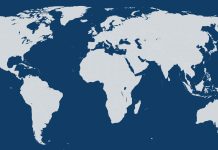The end of the Cold War and the dismantling of what had been a bipolar world order raised the question of what exactly constitutes a superpower. The question has been bandied about even more over the past few years, given some people’s perception that U.S. global influence is weakening relative to the rest of the world’s. China, after all, is seeking to emerge as a major player, and Russia has clawed back from destitution to become more than merely a shadow of its former self.
Indeed, the term “superpower” has been used to describe Russia – occasionally in the context of its partnership with China. Whether or not either is a superpower in its own right, there is an assumption – and a particularly vexing one in the West – that together the two would be a decisive force in the world. But this is a flawed or at least premature assumption.
To understand why, consider the nature of a superpower. After World War II, the term was reserved only for countries that had a nuclear arsenal – that is, countries that possessed a decisive means of victory against even the strongest of enemies. Certainly the public saw them as such. But the military never had a clear definition of what a superpower was. This is largely because the military understood that the concept of mutually assured destruction was baked into any equation of confrontation, and why both largely worked to confine their grievances against each other into smaller threats.
This is no trivial concept. Even now, more than 60 years after their introduction, these words and phrases are important. The idea that national power is central to our lives – and the constant struggle to devise elegant definitions of what it ought to be called – shows that the concept is far more complex than many think. What, for example, is a “great power”? More than mere semantics, what government officials think constitutes a great power can influence geopolitics as they form and shape policy around the definition. Is a great power simply a country that has the ability to defend itself and invade others? If so, many countries could rightly be considered great powers. China certainly could.
But if we think there are only a few great powers in the world, then the definition is something more complex than an accounting of weapons and soldiers. It’s been said that in war the real battle is psychological – that the ability to shape perceptions of reality is perhaps the most important determinant of power. I would argue that cohesion – in public and in the military – are also important factors in determining national power. (It’s tempting to call this morale, but I don’t think that quite covers it.) Vital to cohesion is geography – that is, the ability to maneuver and supply – and the communications on which maneuver and supply depend.
The idiosyncratic point I am trying to make is that great power depends on weapons, warriors, bravery and training, but it also depends on the power to persuade or induce, or even more generally, the ability to get things done. War is not waged with tanks; it is waged with the delivery of fuel to tanks. This is not an Earth-shattering statement, nor am I the first one to say it. But in constructing a model that forecasts the future of, say, the Chinese military, words matter.
We think of military power as the massive engine of war. There is truth in that. But the root of that power is the ability of a force to maintain itself at the essential operational level. Some nations have both. In China, power is determined largely by whether Beijing can sustain it for an extended course. China’s geography internally and along its boundaries indicates that a war waged on its territory could be long, complex and, above all, subtle. This is China’s history and its future. How it handles the subtle will determine whether it can be called a superpower.






